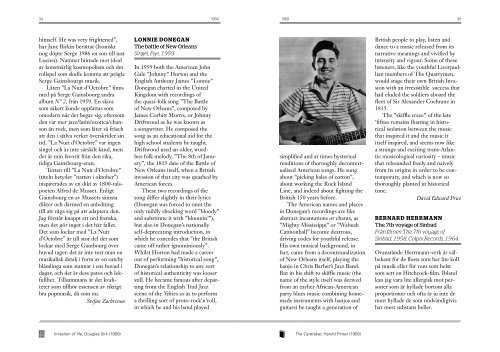1wcEGZ6
1wcEGZ6
1wcEGZ6
Create successful ePaper yourself
Turn your PDF publications into a flip-book with our unique Google optimized e-Paper software.
34 1959<br />
1959<br />
35<br />
himself. He was very frightened”,<br />
har Jane Birkin berättat (Ironiskt<br />
nog döpte Serge 1986 en son till just<br />
Lucien). Namnet hintade mot ideal<br />
av konstnärlig kosmopolism och det<br />
rollspel som skulle komma att prägla<br />
Serge Gainsbourgs musik.<br />
Låten ”La Nuit d’Octobre” finns<br />
med på Serge Gainsbourg andra<br />
album N° 2, från 1959. En skiva<br />
som säkert kunde uppfattas som<br />
omodern när det begav sig, eftersom<br />
den var mer jazz/latin/exotica/chanson<br />
än rock, men som låter så fräsch<br />
att den i själva verket överskrider sin<br />
tid. ”La Nuit d’Octobre” var ingen<br />
singel och är inte särskilt känd, men<br />
det är min favorit från den rika,<br />
tidiga Gainsbourg-eran.<br />
Texten till ”La Nuit d’Octobre”<br />
(titeln betyder ”natten i oktober”)<br />
inspirerades av en dikt av 1800- tals -<br />
poeten Alfred de Musset. Enligt<br />
Gainsbourg en av Mussets sämsta<br />
dikter och därmed en anledning<br />
till att våga sig på att adaptera den.<br />
Jag förstår knappt ett ord franska,<br />
men det gör inget i det här fallet.<br />
Det som lockar med ”La Nuit<br />
d’Octobre” är till stor del det som<br />
lockar med Serge Gainbourg över<br />
huvud taget: det är inte text utan en<br />
musikalisk detalj i form av en catchy<br />
blåsslinga som stannar i ens huvud i<br />
dagar, och det är dess patos och lekfullhet.<br />
Tillsammans är det kvaliteter<br />
som tillhör essensen av riktigt<br />
bra popmusik, då som nu.<br />
Stefan Zachrisson<br />
LONNIE DONEGAN<br />
The battle of New Orleans<br />
Singel, Pye, 1959.<br />
In 1959 both the American John<br />
Gale ”Johnny” Horton and the<br />
English Anthony James ”Lonnie”<br />
Donegan charted in the United<br />
Kingdom with recordings of<br />
the quasi-folk song ”The Battle<br />
of New Orleans”, composed by<br />
James Corbitt Morris, or Johnny<br />
Driftwood as he was known as<br />
a songwriter. He composed the<br />
song as an educational aid for the<br />
high school students he taught.<br />
Driftwood used an older, wordless<br />
folk melody, ”The 8th of January”,<br />
the 1815 date of the Battle of<br />
New Orleans itself, when a British<br />
invasion of that city was quashed by<br />
American forces.<br />
These two recordings of the<br />
song differ slightly in their lyrics<br />
( Donegan was forced to omit the<br />
only mildly shocking word ”bloody”<br />
and substitute it with ”bloomin’”),<br />
but also in Donegan’s nationally<br />
self-deprecating introduction, in<br />
which he concedes that ”the British<br />
came off rather ignominiously”.<br />
Whilst Horton had made a career<br />
out of performing ”historical song”,<br />
Donegan’s relationship to any sort<br />
of historical authenticity was looser<br />
still. He became famous after departing<br />
from the English Trad Jazz<br />
scene of the ’fifties so as to perform<br />
a thrilling sort of proto-rock’n’roll,<br />
in which he and his band played<br />
simplified and at times hysterical<br />
renditions of thoroughly decontextualised<br />
American songs. He sung<br />
about ”picking bales of cotton”,<br />
about working the Rock Island<br />
Line, and indeed about fighting the<br />
British 150 years before.<br />
The American names and places<br />
in Donegan’s recordings are like<br />
abstract incantations or chants, as<br />
”Mighty Mississippi” or ”Wabush<br />
Cannonball” become dextrous,<br />
driving codes for youthful release.<br />
His own musical background, in<br />
fact, came from a decontexualization<br />
of New Orleans itself, playing the<br />
banjo in Chris Barber’s Jazz Band.<br />
But in his shift to skiffle music (the<br />
name of the style itself was derived<br />
from an earlier African-American<br />
party blues music combining homemade<br />
instruments with banjos and<br />
guitars) he taught a generation of<br />
British people to play, listen and<br />
dance to a music released from its<br />
narrative meanings and vivified by<br />
intensity and vigour. Some of these<br />
listeners, like the youthful Liverpudlian<br />
members of The Quarrymen,<br />
would stage their own British Invasion<br />
with an irresistible success that<br />
had eluded the soldiers aboard the<br />
fleet of Sir Alexander Cochrane in<br />
1815.<br />
The ”skiffle craze” of the late<br />
’fifties remains floating in historical<br />
isolation between the music<br />
that inspired it and the music it<br />
itself inspired, and seems now like<br />
a strange and exciting trans-Atlantic<br />
musicological curiosity – music<br />
that rebounded freely and naively<br />
from its origins in order to be contemporary,<br />
and which is now so<br />
thoroughly planted in historical<br />
time.<br />
David Edward Price<br />
BERNARD HERRMANN<br />
The 7th voyage of Sinbad<br />
Från filmen The 7th voyage of<br />
Sinbad, 1958, Colpix Records, 1964.<br />
Ovanstånde Herrmann-verk är välbekant<br />
för de flesta som har lite koll<br />
på musik eller för vem som helst<br />
som sett en Hitchcock-film. Ibland<br />
kan jag vara lite allergisk mot personer<br />
som är hyllade bortom alla<br />
proportioner och ofta är ju inte de<br />
mest hyllade de som nödvändigtvis<br />
har mest substans heller.<br />
Imitation of life, Douglas Sirk (1959)<br />
The Caretaker, Harold Pinter (1959)


